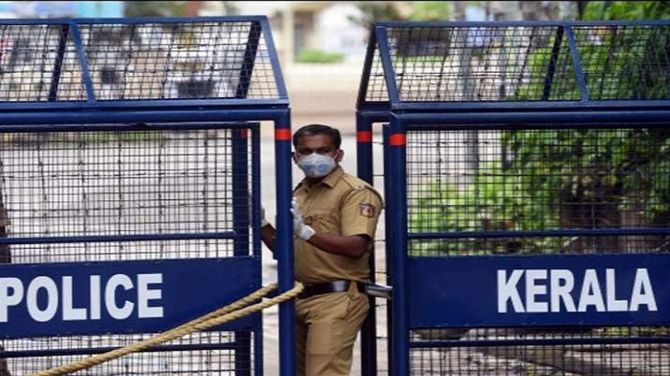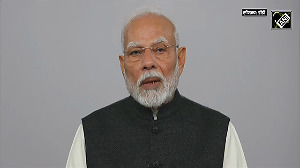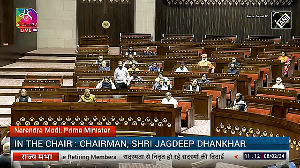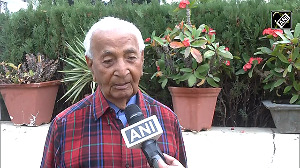What was shocking was the execution of the killings -- calculated, gory and intended to send a chill down the spine.
Sujit Chandra Kumar reports.

"An uneasy calm prevails," says Ajayan, a resident of Alappuzha, days after the sleepy town famous for its backwaters and houseboats was rocked by tit-for-tat murders -- that of K S Shan, the state secretary of the Social Democratic Party of India, followed by that of Bharatiya Janata Party leader Ranjith Sreenivasan about 11 hours later.
"But we are not sure if it is the kind of calm before the next storm," he adds cautiously.
Large numbers of police personnel have been deployed in the area and prohibitory orders issued. The Left Democratic Front government has convened an all-party meeting on December 28 in a bid to stop the violence from escalating further.
The police have arrested two men for Shan's murder while unconfirmed reports say some others have been arrested for Ranjith's murder.
That this peaceful and picturesque region suddenly turned into a violent hot spot came as a shock to those who thought that such brutal political violence was restricted to Kannur in north Kerala.
What was even more shocking was the execution of the killings -- calculated, gory and intended to send a chill down the spine.
Shan, who was riding a two-wheeler, was first knocked down by a car from behind at Mannanchery and then inflicted innumerable injuries to which he succumbed at a Kochi hospital at around 11 that night.
The revenge killing the next morning was even more brutal.
A group of men on six bikes descended on Ranjith's house and hacked him to death in the presence of his family members.
"There were two murders committed by the SDPI prior to this incident in the same revenue district, that of Nandu Krishna in Cherthala in February and Vishal at Chenganur Christian College some time back," alleges Rashtriya Swayamsevak Sangh district karyavahak Unnikrishnan.
"Another RSS worker called Bleetumon was also brutally attacked by SDPI people in Mannanchery. But there was no retaliation from our side for any of these incidents," says Unnikrishnan.
"But when this incident (Shan's murder) happened, they hit back immediately which shows that they were not only expecting it, but have also been preparing for it," Unnikrishnan alleges.
Unnikrishnan admits that his group's workers in the area were restive because of the previous attacks against their colleagues and that the attack on Shan may have been a result of this.
"Except for this one incident, there was no reaction from our side for any of the other atrocities by them," he says.
Does this mean that the chain of violence is likely to continue in the region?
"If our policy was to retaliate, we could have done that in all the areas as we have the capability. But we are not an organisation that believes in taking revenge," says Unnikrishnan. "We don't need martyrs to build our organisation, unlike them. We only want an atmosphere where we can work. Look at the person whom they have killed."
"He was a well-behaved person who never challenged anybody or made any inflammatory speeches. We could not protect him because we never thought they would target such a person."
"Our priority now is to look after his family. We will cooperate with the government in its peace efforts and with the police in the investigation."
SDPI General Secretary Ajmal Ismail denies that his party has anything to do with Ranjith's murder.
"Soon after the attack on Shan, all our leaders in the area were involved in taking him to the hospital in Kochi and afterwards, we were engaged in the post mortem and burial," says Ismail.
"It is not logical to say that any of our leaders or workers planned or did this at such a time. Let the investigation happen and we will cooperate," he says.
Ismail blames the police for being partisan, alleging that instead of arresting the perpetrators involved in Shan's murder and raiding the suspects' hideouts, the police were providing protection to RSS leaders in the area.
Doesn't he find it disturbing that unlike the political killings of the past in the state, the Alappuzha killings are on communal lines? "Who is responsible for it?" he asks.
"Look at the controversies that are being deliberately created to create communal polarisation. Halal, narcotic jihad, thuppal (the controversy surrounding the theory that Muslims spit on food as a religious practice) and attacks against business houses are all part of a planned campaign," says Ismail.
"They killed our party secretary in a place where there was no trouble of any kind with the aim of creating a communal divide," says Ismail. "We have never blamed Hindus, but only the RSS. Even after this incident, we have not harmed anybody from the other community, but there have been attacks against us in the wake of these incidents."
Advocate Jayashankar, a prominent social commentator, says tit-for-tat killings are not a new trend in Kerala and have happened in the Kannur region, Nadapuram, Alappuzha and Kuttanad.
But those were political in nature while the weekend murders stand out for the way in which the killings were executed.
"With the entry of the Popular Front (SDPI is the political wing of the Popular Front), the game has changed completely. Earlier, the killers and the killed were from the same place and the incidents were a result of overflowing emotions," says Jayashankar.
"These people (SDPI) seem to have an all-Kerala network, in fact all over South India. They act in an organised manner."
"Recently, a CPI-M leader was killed in Palakkad. None of the killers were from that district. They come from somewhere and then disappear. Now the RSS has adopted the same method and hit back in the same style. None of the BJP leaders in Alappuzha knew who Shan's killers were," Jayashankar alleges.
"Both groups have their sources in the police and know who has security and who doesn't," says Jayashankar. "Mannanchery is a Muslim pocket and by targeting a key leader in this area, it seems the killers wanted to send a message that they too are capable of acting like the SDPI," he alleges.
"Look at what happened after news spread about Shan's killing. Around midnight, they went about organising protests, not just in Alappuzha, but also in Ernakulam, Pattambi and other places. Hundreds of people raising slogans at that hour!"
"The policing system has failed completely even in identifying the proliferating terror outfits in the state, leave alone taking any action against them," Jayashankar asserts, going on to blame the chief minister and director general of police for this.
Isn't the SDPI just a marginal player in Kerala politics?
"Not many people in the Muslim community are ready to join these forces, but there are many who now sympathise with them," says Jayashankar. "Muslims have insecurity after Narendra Modi took over at the Centre. Mainstream parties like the Muslim League are losing their influence. The SDPI wants to capitalise on the desolation of the ordinary Muslim."
Feature Presentation: Aslam Hunani/Rediff.com











 © 2024 Rediff.com -
© 2024 Rediff.com -